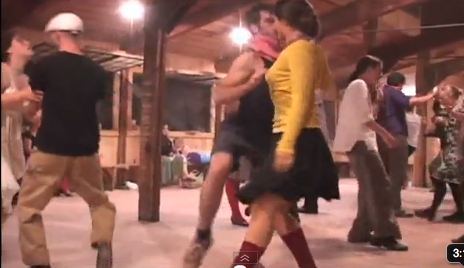“Even Dudley Laufman’s Canterbury Contra Dance Orchestra recorded with electric guitar in the 1970s! The most recent manifestation of our vibrant and evolving history is integrating electronic music into contra dancing, often referred to as ‘techno contra,’ ” writes Alex Krogh-Grabbe in a post on Country Dance and Song Society’s website.
“Other terms include ‘alternative music contra’ and ‘crossover contra,’ ” Krogh-Grabbe continues, though he prefers “crossover contra” as more accurately descriptive. Here are excerpts from Krogh-Grabbe’s post:
The movement quickly dubbed “techno contra” seems to have begun at the Whipperstompers Weekend in South Carolina in June 2008, a dance weekend organized by Able Allen [a young blacksmith from Brasstown] catering to young dancers. At the end of the weekend, after many attendees had already left, an impromptu dance was called by Taija Tevia-Clark to techno music from someone’s iPod. A brief video from the end of this dance was posted on YouTube, and has been viewed more than 5,000 times:
In attendance at the Whipperstompers techno contra were two dancers who went on to be influential in the early spread of crossover contra. Forrest Oliphant of [Brasstown,] North Carolina was inspired by the Whipperstompers video to create something similar, but with more planning. He got his opportunity at the inaugural Youth Dance Weekend (YDW) in late September 2008. He organized a techno contra after the scheduled dances were over, and shot two takes of two sets dancing to Adam Tensta’s “My Cool”.
Also in attendance at both Whipperstompers and YDW was Jordy Williams of Asheville, NC. Seeing the potential in the dances at those two weekends, Jordy was inspired to organize similar events of his own. He has put on invitational techno contras in Asheville every few months since the first one in June 2009. While most crossover contra dances up to that point had been in the traditional 10-15 minute per dance format, Jordy structured his differently, with techno tracks strung together in 90-minute medleys. At the second YDW, in September 2009, a late-night techno medley was coordinated by Jordy. He continues to organize periodic techno contra dances in Asheville, including the first fully public one on New Year’s Day, 2011.
Read Alex Krogh-Grabbe post here.



Try as I might, I still don’t understand the allure of these two musical ‘flavors’ brought together. Hey, if it works for the folks who enjoy it, good for them.
I’m not scratching my head for the “keeping contra music pure” aspect as contra music is a New England centered form of music and not native to the southern mountains. I think you guys at the Xpress ran some sort of article a few years back about the rise of techno/dance type music for buckdancing up in WVA too, so maybe this isn’t an isolated incident.
I’m more scratching my head wondering if the playing has changed for the actual musicians, aka are they still playing instruments for the most part of can a CD of techno music now be substituted like they do at many of the dance oriented nights at local clubs?
All in all, the hybrid aspect of all this seems to be aimed more at the dancers vs. the players. I like playing old time music, but for the record I can’t dance to save my life.
Boatrocker,
You are not the only one that has voiced this fear, but hopefully as someone who avidly enjoys both regular contra dance and the recent “techno” variety, I can allay it a bit.
There are still plenty of traditional contra dance series out there and there are plenty of bands that play traditional, non-electronic sets for contra dances still, sometimes to packed venues (e.g., the New-England based Swallowtail, Wild Asparagus).
Many if not most of the people at the techno contra dances are also avid traditional contra attendees and even the bands that play a synthesis of the two forms (i.e., are live but still use electronic additions — Perpetual e-Motion and Double Apex come to mind) are still quite adamant that the tradition still has a place in the world and lots of crossover-contra aficionados (dancers, musicians, and even the DJs that spin the crossover events) have stated many times that they would be really sad if the tradition-as-product went away. I don’t see it as the CDs replacing the musicians; rather, crossover contra is a bit of a different animal that exists because a lot of us really love the dance tradition and want to show other people–some of whom may not connect with the original music, at least not yet–how awesome and fun this tradition can be. At the last techno contra event I went to in Charlottesville, VA, I ended up sitting out with someone brand new to contra dancing and talked him into checking out the traditional dances in the area; and I know I’m not the only dancer who has done that.
To my mind, there is room for both sorts, and I am extremely happy and consider myself lucky to attend both types of events regularly. :)
Ryan
http://www.contrasyncretist.com
Dear Ryan- you incorrectly assume I can tolerate contra dances and the “That’s not how we do it in New England” mentality. Try old time music. You’ll like it. It’s called a backbeat.
The experimentation is over. The new scene in Techno Contra in Asheville and surrounding areas is
Technocontra.com
facebook.com/technocontra